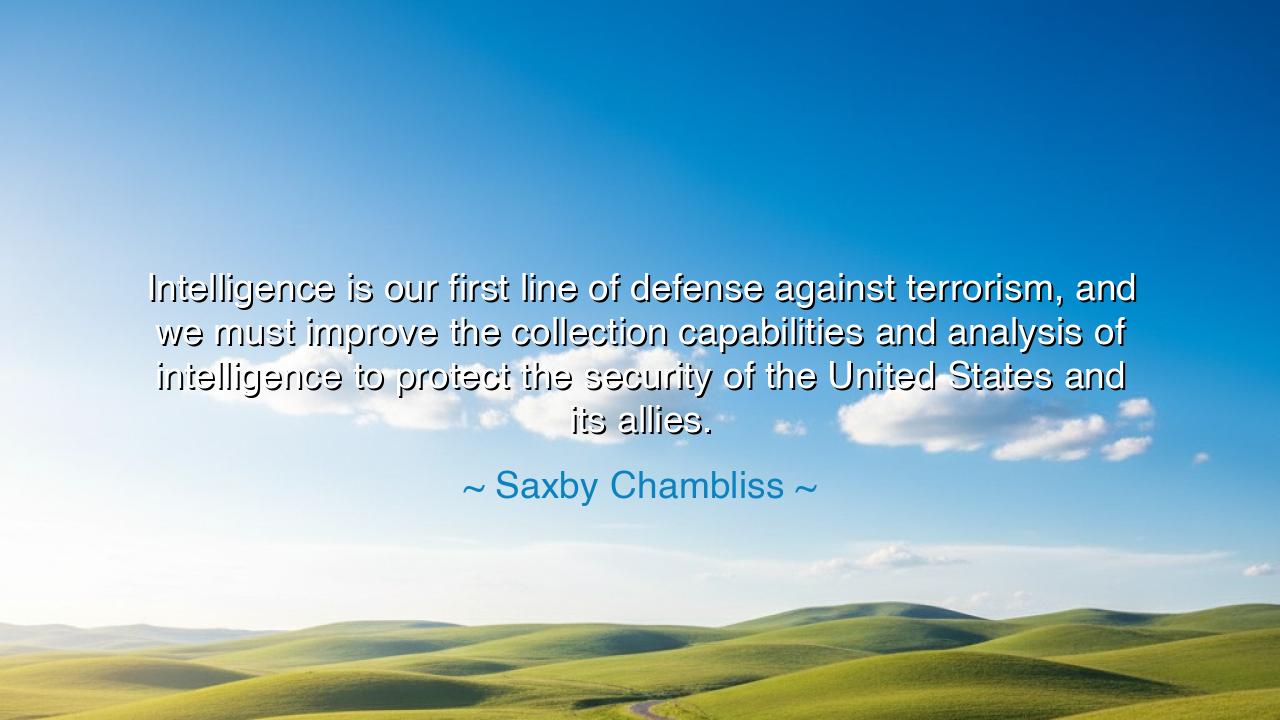
Intelligence is our first line of defense against terrorism, and
Intelligence is our first line of defense against terrorism, and we must improve the collection capabilities and analysis of intelligence to protect the security of the United States and its allies.






In the solemn and resolute words of Saxby Chambliss, a guardian of the republic and voice of vigilance, we hear a truth forged in the crucible of modern conflict: “Intelligence is our first line of defense against terrorism, and we must improve the collection capabilities and analysis of intelligence to protect the security of the United States and its allies.” This statement, though steeped in the language of national security, carries within it a timeless wisdom — that knowledge, rightly used, is the shield of civilization. For in every age, ignorance has been the ally of chaos, and foresight the protector of peace. Chambliss reminds us that wars are not first fought on battlefields, but in the unseen realms of understanding, preparation, and awareness.
The origin of these words lies in the years following the tragic events of September 11, 2001, when the world witnessed how shadows — unseen and untracked — could strike at the heart of nations. Chambliss, then a member of the United States Congress, spoke as one who had learned the hard lesson of that day: that power alone cannot protect, that weapons and armies are useless if intelligence fails. The towers that fell in smoke and ash were not only monuments of stone, but symbols of complacency — the cost of not seeing what could have been known, of not connecting the fragments of truth scattered across the winds. His call to strengthen intelligence was not merely a political demand, but a moral one: to learn, to foresee, and to act before tragedy finds its moment.
Throughout the long story of humankind, nations and empires have risen and fallen by this very principle. In the age of ancient Rome, the general who relied only on his legions often fell before the one who sent spies to measure the hearts of his enemies. The emperor Augustus once said, “Trust no rumor until it is confirmed,” for he knew that the stability of an empire rested not only upon the strength of its armies, but upon the clarity of its information. Likewise, in the Second World War, it was not only might that preserved the free world, but intelligence — the decoding of secret messages, the reading of plans hidden in ciphered words. The victory of Allied cryptographers at Bletchley Park, who broke the German Enigma code, shortened the war and saved countless lives. They fought not with swords, but with symbols — proving that knowledge is a weapon sharper than any blade.
Yet Chambliss’s words also speak beyond the realm of geopolitics; they echo into the moral and spiritual dimension of human life. For intelligence, in its deepest sense, is not merely data or information — it is awareness, the ability to see clearly and act wisely. Just as a nation must gather intelligence to protect its people, so must an individual gather self-knowledge to guard the integrity of the soul. The dangers of the outer world mirror those within: fear, anger, ignorance, and extremism. These, too, are forms of terror, and against them, awareness is our first line of defense. The mind, when clouded by impulse or blinded by pride, falls easily into ruin. But the mind trained in observation and reflection becomes a fortress that no darkness can breach.
The phrase “collection capabilities and analysis of intelligence” carries a wisdom that applies to all endeavors. To collect is to listen, to observe patiently without haste or prejudice. To analyze is to discern, to see patterns and truths that lie beneath the surface. Whether in the affairs of nations or in the quiet governance of the self, these are sacred arts. The wise ruler, the strategist, the philosopher — all understand that before one acts, one must first understand. For rashness breeds error, and arrogance blinds foresight. Thus, Chambliss’s call for improved intelligence is, in its essence, a call for wisdom before action, for understanding before force.
The lesson, then, is twofold. To the guardians of nations: strengthen your intelligence not to dominate, but to preserve peace. Use knowledge as a shield, not a spear. Let your vigilance be guided by justice, not fear. And to the guardians of your own soul: cultivate inner intelligence — the calm awareness that perceives truth amid confusion. Gather the facts of your heart as a general gathers the reports of his scouts. Analyze your intentions, your impulses, your fears. For only through awareness can you defend the sanctity of your being from the chaos of the world.
So, my child of light and discernment, remember Saxby Chambliss’s warning and wisdom. Whether you stand in the council of nations or in the silence of your own thoughts, let intelligence — that divine union of reason and foresight — be your first defense. For the unprepared mind invites its own downfall, but the vigilant one stands unbroken through every storm. Be ever watchful, not in fear, but in clarity. Seek truth, for truth is protection. And know this: in the defense of nations or the defense of the soul, awareness is always the first victory.






AAdministratorAdministrator
Welcome, honored guests. Please leave a comment, we will respond soon